2010 : NATO’s year in review
Moves to transition to Afghan lead, improvements in relations with Russia, and charting the Alliance’s path for years to come at the Lisbon Summit.

-
January
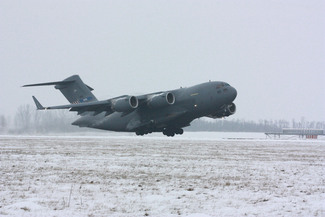
In early January, NATO’s Multinational Strategic Airlift Capability (SAC) conducts a humanitarian mission to Haiti, delivering first aid kits and supplies to the earthquake-stricken country.
- SAC flies its first humanitarian relief flight to Haiti
- C17 conducts third humanitarian relief flight to Haiti
28 January heralds the landmark London Conference on Afghanistan at which international partners of Afghanistan reaffirm their commitment to bringing peace and stability to the country. Leaders agree that there is no military solution to Afghanistan and strongly support political initiatives like reconciliation and reintegration.
-
February
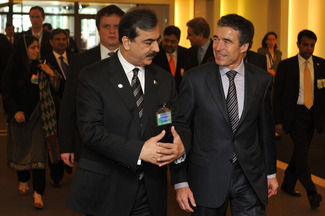
Encouraging an invigorated Alliance to increase its global reach, the Secretary General addresses the Munich Security Conference attended by world defence and security policy leaders.
Increased practical cooperation with other international organisations topped the agenda during a high-level African Union visit mid-February, with NATO providing air- and sea-lift and capacity building to the AU.
February sees the beginning of an intensified political relationship between NATO and Pakistan, which ultimately culminates in the visit of Pakistani Prime Minister Gilani in June.
-
March
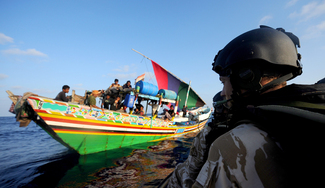
24 March marks the first anniversary of Operation Ocean Shield (initially called Operation Allied Protector), NATO’s counter-piracy operation in the Gulf of Aden. Growing piracy in the Gulf of Aden and off the Horn of Africa is threatening to undermine international humanitarian efforts in Africa, as well as safety of commercial maritime routes and international navigation. NATO is actively helping to increase security by conducting counter-piracy operations in the area, an initiative it originally launched in October 2008 with Operation Allied Provider.
- One Year On NATO Remains Vigilant in Gulf of Aden (.PDF/142Kb)
- NATO's Counter-piracy operations A-Z Page
At a high-level meeting of North American and European political, corporate and intellectual leaders (the German Marshall Fund Brussels Forum), the Secretary General launches the notion of ‘one security roof’ from Vancouver to Vladivostok through a comprehensive missile defence system.
-
April
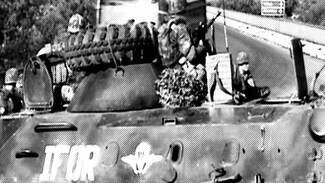
At the ministerial meeting in Tallinn, Estonia, NATO Foreign Ministers address an ambitious agenda, including discussion on the new Strategic Concept, NATO’s nuclear policy and the prospects for cooperation on missile defence. Following on from the London Conference on Afghanistan in January, the Foreign Ministers agree on a common approach to help the Afghan government to take increasingly greater responsibility for their own affairs – in essence, a road map for transition to Afghan lead.
Also at Tallinn, Bosnia and Herzegovina is invited to join the Membership Action Plan, pending progress on key defence reforms – an important turning point in NATO’s relations with the country. Later in the year, 14 December, marks the fifteenth anniversary of another key milestone: the Dayton Peace Agreement, which ended the 1992-1995 Bosnian War and led to the deployment of NATO’s first peacekeeping operation.
- Bosnia and Herzegovina and Membership Action Plan
- 15 years ago, Dayton Peace Accords: a milestone for NATO and the Balkans
NATO and Russia begin testing a joint system for air traffic coordination to better jointly fight terrorism through the early notification of suspicious air activities.
- NATO and Russia step up their efforts to counter air terrorism
- NATO-Russia relations (A-Z page)
- NATO –Russia Cooperative Airspace Initiative (A NATO Chronicles video)
-
May
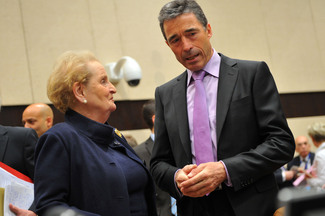
On 10-11 May, the NATO Cooperative Cyber Defence Centre of Excellence and several Swedish government institutions organize Exercise Baltic Cyber Shield. Cyber defence is one of the most current and pressing security issues and NATO is rising to the challenge.
- Baltic Cyber Shield to train technical skills for countering cyber attacks (on the Cooperative Cyber Defence website, Centre of Excellence Tallinn, Estonia)
- Defending against cyber attacks
After significant consultation and deliberation, including a range of high-level seminars in NATO and partner countries over the preceding months, the Group of Experts, chaired by Madeleine K. Albright, submits its analysis and recommendations for NATO’s new Strategic Concept. The report “ NATO 2020: Assured Security: Dynamic Engagement” is formally handed over to the Secretary General and NATO nations on 17 May at NATO Headquarters.
- Presentation of the recommendations of the Group of Experts on NATO's New Strategic Concept
- Analysis and recommendations of the Group of Experts on a new strategic concept for NATO (.PDF/362KB)
-
June
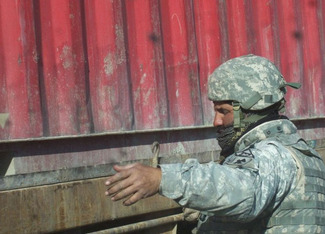
Following the conclusion of arrangements for the transit of ISAF non-lethal cargo by rail with the Russian Federation, Ukraine, Uzbekistan, Belarus and Kazakhstan, the first trial shipment departs Riga, Latvia, on 14 May and arrives in Afghanistan on 9 June 2010. This transit agreement is essential for diversifying the supply routes to Afghanistan by land, which is significantly less expensive than supplying by air.
The June Defence Ministers’ meeting addresses reform and resources. As the financial crisis puts pressure on defence budgets in all NATO countries, Ministers look at ways to make the Alliance leaner, more effective and less costly.
The Secretary General carries forward the theme of fiscal responsibility in his speech to the Security and Defence Agenda, presenting the financial crisis as a rare opportunity to make NATO truly fit for the 21st century.
24 June: signing ceremony for establishing a Centre of Excellence on Counter-improvised explosive devices (IED) in Madrid that will focus on tackling the system of IEDs and the devices themselves, and training experts in this field.
-
July

On 19 July, the heads of the NATO theatre missile defence programme announce that NATO’s first ever theatre missile defence capability has passed key tests. This follows a number of important milestones, including the signature of related contracts in June.
- NATO missile defence capability passes key tests
- Missile defence (NATO A-Z page)
On 20 July, the Secretary General takes part in the International Conference on Afghanistan in Kabul, where the Afghan government presents its programme for transition to Afghan responsibility and ownership. As part of this process, the Afghan government and the international community, including NATO, endorse a joint framework for transition to Afghan security lead.
-
August
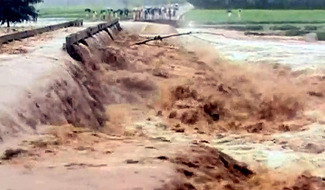
On 4 August, in the continuing effort to adapt the Alliance, a new division within the NATO International Staff is created to deal with a growing range of non-traditional risks and challenges. The Emerging Security Challenges division focuses on terrorism, the proliferation of weapons of mass destruction, cyber defence and energy security.
Following disastrous floods, upon the request of the Pakistani government, the Euro-Atlantic Disaster Response Coordination Centre (EADRCC) at NATO HQ in Brussels mobilises to provide air- and sea-lift for the delivery of flood-relief supplies to Pakistan.
-
September
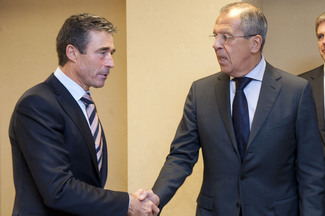
NATO’s Secretary General lauds the steady improvement in relations with Russia throughout 2010 in a speech at the Aspen Institute in Rome, Italy. He states that Allies and Russia have come to fulfil “a desire to build a lasting, inclusive peace in the Euro-Atlantic area, on the principles of democracy, cooperation and the indivisibility of security of all states.”
Afghan voters and parliamentary candidates show their determination to resist intimidation as they choose their own leaders and path for their country in landmark 2010 Afghan parliamentary elections, which are the first to be entirely Afghan-led and Afghan-run..
On 21-22 September, the Secretary General meets world leaders at the United Nations General Assembly. . He emphasises the need to transfer to Afghan responsibility in the fields of both security and development . He calls upon the government in Kabul to fight corruption and deliver basic services to the Afghan people, and pledges to focus more on the Afghan population.
- At the United Nations General Assembly: The way forward in Afghanistan (NATO Secretary General's blog)
The NATO-Russia Council meets in New York on 22 September. Foreign Ministers express their shared view that the time has come to enhance relations and discuss areas in which practical cooperation could be deepened against common challenges, such as Afghanistan, fighting piracy and combating terrorism.
-
October
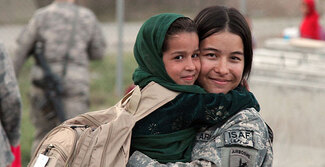
At an event hosted by the German Marshall Fund, the Secretary General publicly charts the direction of NATO’s new Strategic Concept, summing it up. as “active engagement, modern defence.”
At the first ever joint NATO Foreign and Defence Ministerial meeting, 14 October, ministers give final political guidance in preparation for the NATO Summit in Lisbon.
NATO’s Secretary General emphasizes that women must be part of peace building in a keynote speech at a conference in Copenhagen, Denmark, organised to mark the 10th anniversary of United Nations Security Council Resolution 1325. The resolution recognizes the disproportionate impact that war and conflicts have on women and children, and highlights the fact that historically women have been left out of peace processes and stabilization efforts. NATO and its Partners are promoting the role of women within NATO-led operations and missions, as well as improving their knowledge and skills in relation to questions of gender and diversity.
- Speech by NATO Secretary General Anders Fogh Rasmussen at the Conference on the Role of Women in Global Security, Copenhagen
- Women, peace and security (NATO Secretary General's blog)
- Women, peace and security : NATO’s implementation of UNSCR 1325 (NATO A-Z page)
On 29 October, NATO decides gradually to reduce the KFOR presence in Kosovo to around 5,000 troops, marking one more step in the adaptation of KFOR to a deterrent presence. NATO has been leading a peace-support operation in Kosovo since June 1999 in support of wider international efforts to build peace and stability there.
-
November
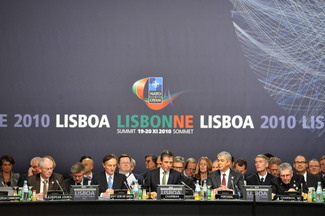
On 20 November, the Lisbon Summit concludes with decisions that will change the way NATO does business, making the Alliance more effective, more efficient and more engaged with the wider world.
NATO leaders adopt new Strategic Concept, the Alliance’s roadmap for the next ten years. They reconfirm their commitment to defend one another against attack and to promote security in the Euro-Atlantic area and beyond, through partnership and cooperation with non-member countries and other organizations.
During the two-day meeting, Allies also decide to:
- develop new capabilities necessary to defend against modern threats such as ballistic missile and cyber attacks;
- make a fresh start in relations with Russia, with the aim of building a true strategic partnership;
- reach out to partners around the globe;
- streamline the Alliance’s military command structure and make NATO more efficient.
The 28 NATO Allies are joined during the Summit by the 20 partners who are contributing forces to the mission in Afghanistan, as well as representatives of the United Nations, the World Bank and the European Union, and Afghan President Hamid Karzai. Together, they launch a process for the gradual transfer to Afghan lead of security, with Afghan security forces increasingly taking the lead for security operations across the country, starting early 2011.
The NATO Secretary General also signs an agreement with President Karzai on a long-term partnership between the Alliance and Afghanistan that will endure beyond the combat mission. With this partnership, NATO will stay as long as necessary to support Afghanistan until it can no longer become a safe haven for terrorism.
Also in Lisbon, the third summit in the history of the NATO-Russia Council marks a reset in relations. The 29 NRC leaders pledge to “work towards achieving a true strategic and modernized partnership”. They endorse a Joint Review of 21st Century Common Security Challenges and agree to develop practical cooperation in each area. They also decide to resume cooperation in the area of theatre missile defence as well as to analyse the possible future framework for broader missile defence cooperation. NRC leaders also agree a number of initiatives to assist in the stabilization of Afghanistan and the wider region.
